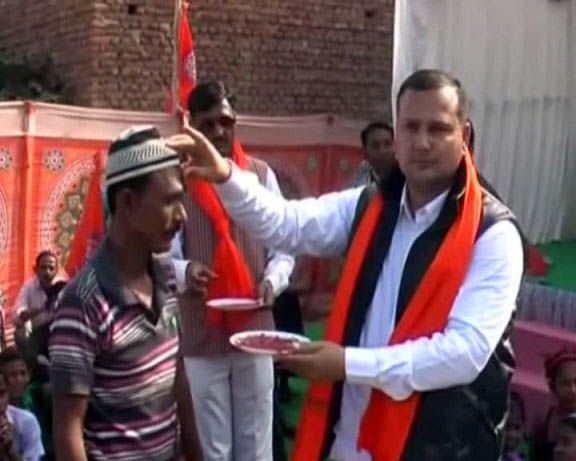 Banning conversion would harm Hinduism by taking away the need for reform, argues Amberish K Diwanji.
Banning conversion would harm Hinduism by taking away the need for reform, argues Amberish K Diwanji.
The country has been in a bit of a flap after news reports about the 'ghar vapasi' programme wherein some poor Muslims were apparently converted to Hinduism in Agra. This led to an uproar both outside and inside Parliament which the ruling Bharatiya Janata Party has been quick to use to call for a ban on conversions.
The right to convert to another religion is guaranteed as a human right by the United Nations. It is also what distinguishes some of the world's most despotic nations from the democratic nations.
Thus the Western world allows conversion while many Islamic nations have banned conversion from Islam to another religion while permitting conversion to Islam.
Do we want to become a Saudi Arabia or Iran? As an avowedly secular nation, surely we should separate religion from the State.
There is another aspect to conversion in India. For years, many right-wing Hindu organisations have been demanding a ban on conversion. The reasons cited are that the poor Hindus of India are lured into becoming Christians or Muslims and that Hindus are too poor to fight these organised religions with deep pockets.
This is less than true. Granted that Christian missionaries are active in the poorest areas, and do convert people to their faith, particularly the tribal population, but what have Hindu organisations or even the State done to help the poor tribals?
All too often the people who exploit the tribals (money lenders, contractors and government officials) tend to be Hindus, and their activities unfortunately earns Hinduism a bad name.
The question is what are the Hindu organisations doing? They are too busy collecting funds to build temples rather than help the poor.
Conversion to Islam is far more muted, given the sensitivities involved. But the promise of equality and brotherhood in Islam remains a potent weapon to lure India's most wretched.
The best example is the conversion of a number of Dalits in Meenakshipuram, Tamil Nadu, in the early 1980s to Islam. The popular perception is that the Dalits were poor; in fact they were not. They were well-off Dalits who had earned good money in the Gulf and returned as prosperous citizens to India.
They converted after finding that despite their wealth, they were treated badly because they were Dalits. Do note these Dalits believed they would be treated better as Muslims!
That remains the major problem of Hinduism. A recent survey of caste attitudes revealed, shockingly, that many Indians continue to hold Dalits in contempt. This applies to all religions. Ironically, the allegedly educated caste of Brahmins came off the worst with 52 per cent saying they would not let Dalits enter their kitchen, followed by the Other Backward Classes, where about a third revealed such attitudes.
Only when Dalits or Adivasis threaten to convert are the virtues of Hinduism discovered; the moment this threat fades, old caste prejudices return with a vengeance. Conversion remains an escape route for the Dalits and Adivasis when both the State and their Hindu brethren have deserted them. Now, we want to take away this one privilege that they still have.
As the Vishwa Hindu Parishad has shown: conversion can be used both ways. It is good to read that some Muslims chose to convert (there is some dispute, but let us go with the reports that they converted). If anything, these poor Muslims were the equivalent of Dalits -- ignored and treated badly by their community leaders.
Why should the poor Muslims convert for a ration card? If the government failed, where were the community leaders (busy playing politics)? Hopefully, the Muslim community will now awaken to the plight of their poorest.
The argument that Hindus don't have funds to fight Christian missionaries funded by the wealthy West, or Muslim groups funded by West Asian oil (an income that is heading downwards), is facetious. The poor are not fools. A few may convert for money, but millions convert for self-respect and dignity. They convert to be treated as fellow humans.
Millions of Hindus became Muslims not because of the invading armies but because the wandering Sufis gave them brotherhood; the Christian missionary gave them love.
Hinduism has its own virtues, -- its openness, its tolerance -- that has lured many, but right now these are hidden under the stranglehold of caste prejudices. The fear of losing its adherents has actually prompted reform and resurgence.
To ban conversion would mean to lose the very impetus for reform. Banning conversions would be not just retrograde, it would harm Hinduism by taking away the need for reform and improvement.
Image: Muslims allegedly being converted in Agra.
OTHER COLUMNS ON CONVERSION:
- Varsha Bhosle: In the name of the Lord
- Dilip D'Souza: Of White Powders And Other Benefits
- Varsha Bhosle: The preying Church
- Amberish Kathewad Diwanji: Conversion and the State
- Rajeev Srinivasan: In today's complex world, it is not dogma that is needed. It is adaptability, live-and-let-live
- Varsha Bhosle: Towards Balkanisation: Adivasis
- T V R Shenoy: Yes, let's debate conversion
- Vir Sanghvi: A case for conversion










